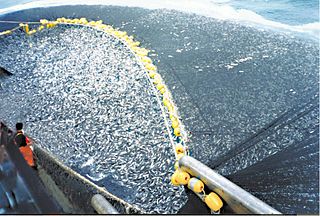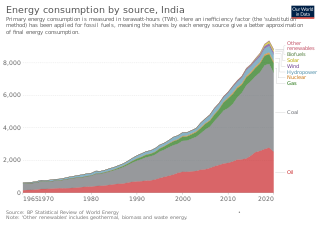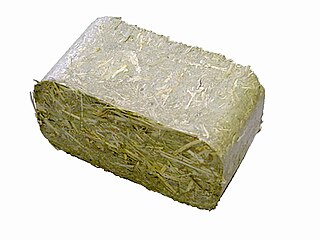
Biofuel is a fuel that is produced over a short time span from biomass, rather than by the very slow natural processes involved in the formation of fossil fuels such as oil. Biofuel can be produced from plants or from agricultural, domestic or industrial bio waste. Biofuels are mostly used for transportation, but can also be used for heating and electricity. Biofuels are regarded as a renewable energy source. The use of biofuel has been subject to criticism regarding the "food vs fuel" debate, varied assessments of their sustainability, and ongoing deforestation and biodiversity loss as a result of biofuel production.

A renewable resource is a natural resource which will replenish to replace the portion depleted by usage and consumption, either through natural reproduction or other recurring processes in a finite amount of time in a human time scale. When the recovery rate of resources is unlikely to ever exceed a human time scale, these are called perpetual resources. Renewable resources are a part of Earth's natural environment and the largest components of its ecosphere. A positive life-cycle assessment is a key indicator of a resource's sustainability.

Solid fuel refers to various forms of solid material that can be burnt to release energy, providing heat and light through the process of combustion. Solid fuels can be contrasted with liquid fuels and gaseous fuels. Common examples of solid fuels include wood, charcoal, peat, coal, hexamine fuel tablets, dry dung, wood pellets, corn, wheat, rice, rye, and other grains. Solid fuels are extensively used in rocketry as solid propellants. Solid fuels have been used throughout human history to create fire and solid fuel is still in widespread use throughout the world in the present day.

A biorefinery is a refinery that converts biomass to energy and other beneficial byproducts. The International Energy Agency Bioenergy Task 42 defined biorefining as "the sustainable processing of biomass into a spectrum of bio-based products and bioenergy ". As refineries, biorefineries can provide multiple chemicals by fractioning an initial raw material (biomass) into multiple intermediates that can be further converted into value-added products. Each refining phase is also referred to as a "cascading phase". The use of biomass as feedstock can provide a benefit by reducing the impacts on the environment, as lower pollutants emissions and reduction in the emissions of hazard products. In addition, biorefineries are intended to achieve the following goals:
- Supply the current fuels and chemical building blocks
- Supply new building blocks for the production of novel materials with disruptive characteristics
- Creation of new jobs, including rural areas
- Valorization of waste
- Achieve the ultimate goal of reducing GHG emissions

Bioenergy is a type of renewable energy that is derived from plants and animal waste. The biomass that is used as input materials consists of recently living organisms, mainly plants. Thus, fossil fuels are not regarded as biomass under this definition. Types of biomass commonly used for bioenergy include wood, food crops such as corn, energy crops and waste from forests, yards, or farms.

Waste-to-energy (WtE) or energy-from-waste (EfW) refers to a series of processes designed to convert waste materials into usable forms of energy, typically electricity or heat. As a form of energy recovery, WtE plays a crucial role in both waste management and sustainable energy production by reducing the volume of waste in landfills and providing an alternative energy source.
Renewable fuels are fuels produced from renewable resources. Examples include: biofuels, Hydrogen fuel, and fully synthetic fuel produced from ambient carbon dioxide and water. This is in contrast to non-renewable fuels such as natural gas, LPG (propane), petroleum and other fossil fuels and nuclear energy. Renewable fuels can include fuels that are synthesized from renewable energy sources, such as wind and solar. Renewable fuels have gained in popularity due to their sustainability, low contributions to the carbon cycle, and in some cases lower amounts of greenhouse gases. The geo-political ramifications of these fuels are also of interest, particularly to industrialized economies which desire independence from Middle Eastern oil.

In the context of energy production, biomass is matter from recently living organisms which is used for bioenergy production. Examples include wood, wood residues, energy crops, agricultural residues including straw, and organic waste from industry and households. Wood and wood residues is the largest biomass energy source today. Wood can be used as a fuel directly or processed into pellet fuel or other forms of fuels. Other plants can also be used as fuel, for instance maize, switchgrass, miscanthus and bamboo. The main waste feedstocks are wood waste, agricultural waste, municipal solid waste, and manufacturing waste. Upgrading raw biomass to higher grade fuels can be achieved by different methods, broadly classified as thermal, chemical, or biochemical.

Biofuels are renewable fuels that are produced by living organisms (biomass). Biofuels can be solid, gaseous or liquid, which comes in two forms: ethanol and biodiesel and often replace fossil fuels. Many countries now use biofuels as energy sources, including Sweden. Sweden has one of the highest usages of biofuel in all of Europe, at 32%, primarily due to the widespread commitment to E85, bioheating and bioelectricity.
Second-generation biofuels, also known as advanced biofuels, are fuels that can be manufactured from various types of non-food biomass. Biomass in this context means plant materials and animal waste used especially as a source of fuel.

Since 2013, the total primary energy consumption in India has been the third greatest in the world after China and the United States. Having the largest national population of over 1.4 billion people, though, its per capita energy consumption is still in the lower half of all nations'. India was a net energy importer to meet nearly 47% of its total primary energy in 2019.

Algae fuel, algal biofuel, or algal oil is an alternative to liquid fossil fuels that uses algae as its source of energy-rich oils. Also, algae fuels are an alternative to commonly known biofuel sources, such as corn and sugarcane. When made from seaweed (macroalgae) it can be known as seaweed fuel or seaweed oil. These fuels have no practical significance but remain an aspirational target in the biofuels research area.

There are multiple environmental issues in India. Air pollution, water pollution, garbage, domestically prohibited goods and pollution of the natural environment are all challenges for India. Nature is also causing some drastic effects on India. The situation was worse between 1947 through 1995. According to data collected and environmental assessments studied by World Bank experts, between 1995 through 2010, India has made some of the fastest progress in addressing its environmental issues and improving its environmental quality in the world. However, pollution still remains a major challenge and opportunity for the country.

Sustainable biofuel is biofuel produced in a sustainable manner. It is not based on petroleum or other fossil fuels. It includes not using plants that are used for food stuff to produce the fuel thus disrupting the world's food supply.

An aviation biofuel is a biofuel used to power aircraft. The International Air Transport Association (IATA) considers it a key element in reducing the environmental impact of aviation. Aviation biofuel is used to decarbonize medium and long-haul air travel. These types of travel generate the most emissions, and could extend the life of older aircraft types by lowering their carbon footprint. Synthetic paraffinic kerosene (SPK) refers to any non-petroleum-based fuel designed to replace kerosene jet fuel, which is often, but not always, made from biomass.
Issues relating to biofuel are social, economic, environmental and technical problems that may arise from biofuel production and use. Social and economic issues include the "food vs fuel" debate and the need to develop responsible policies and economic instruments to ensure sustainable biofuel production. Farming for biofuels feedstock can be detrimental to the environment if not done sustainably. Environmental concerns include deforestation, biodiversity loss and soil erosion as a result of land clearing for biofuels agriculture. While biofuels can contribute to reduction in global carbon emissions, indirect land use change for biofuel production can have the inverse effect. Technical issues include possible modifications necessary to run the engine on biofuel, as well as energy balance and efficiency.

Biomass briquettes are a biofuel substitute made of biodegradable green waste with lower emissions of greenhouses gases and carbon dioxide than traditional fuel sources. This fuel source is used as an alternative for harmful biofuels. Briquettes are used for heating, cooking fuel, and electricity generation usually in developing countries that do not have access to more modern fuel sources. Biomass briquettes have become popular in developed countries due to the accessibility, and eco-friendly impact. The briquettes can be used in the developed countries for producing electricity from steam power by heating water in boilers.

Stubble burning is the practice of intentionally setting fire to the straw stubble that remains after grains, such as rice and wheat, have been harvested. The technique is used to quickly and cheaply clear fields. It is still widespread today.
Bioenergy forms a small part of the Turkish energy sector. There is unrealised potential to generate bioenergy using waste from the country's vast agricultural sector and forest resources. The possibility of expanding biogas, biofuel and bioethanol production and use has been suggested to supplement Turkey's energy needs, reduce dependency on fossil fuel imports and cut greenhouse gas emissions.

Takachar is a limited company based in Boston as a spin-off from the Massachusetts Institute of Technology (MIT). It is developing torrefaction reactors, which will cook agricultural waste to create biochar or biocoal – a modernised form of charcoal burning. The target market is India, where traditional methods such as stubble burning create large amounts of smoke and have been a significant cause of air pollution.


















